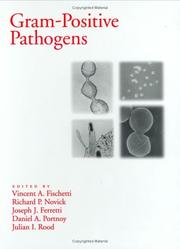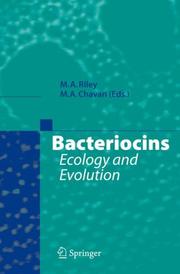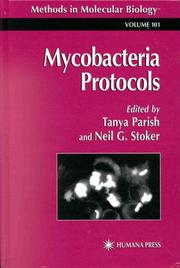| Listing 1 - 4 of 4 |
Sort by
|

ISBN: 1555811663 Year: 2000 Publisher: ASM Press,
Abstract | Keywords | Export | Availability | Bookmark
 Loading...
Loading...Choose an application
- Reference Manager
- EndNote
- RefWorks (Direct export to RefWorks)
Gram-Positive Bacteria. --- Bacterial Vaccines. --- Drug Resistance, Microbial. --- Gram-Positive Bacterial Infections. --- Antimicrobial Drug Resistance --- Antibiotic Resistance --- Antibiotic Resistance, Microbial --- Antimicrobial Drug Resistances --- Drug Resistances, Microbial --- Resistance, Antibiotic --- Microbial Sensitivity Tests --- Bacterial Vaccine --- Bacterin --- Vaccine, Bacterial --- Vaccines, Bacterial --- Gram-positive bacteria. --- Gram-positive bacterial infections. --- Gram-positive bacteria --- Gram-positive bacterial infections --- Bacterial Vaccines --- Drug Resistance, Microbial --- Gram-Positive Bacteria --- Gram-Positive Bacterial Infections --- Infections, Gram-Positive Bacterial --- Bacterial Infections, Gram-Positive --- Bacterial Infection, Gram-Positive --- Bacterial Infections, Gram Positive --- Gram Positive Bacterial Infections --- Gram-Positive Bacterial Infection --- Infection, Gram-Positive Bacterial --- Infections, Gram Positive Bacterial --- Gram Positive Bacteria --- Bacterial diseases --- Bacteria --- Bacterial vaccines

ISBN: 3540366040 3540366032 3642071708 Year: 2007 Publisher: Berlin, Heidelberg : Springer Berlin Heidelberg : Imprint: Springer,
Abstract | Keywords | Export | Availability | Bookmark
 Loading...
Loading...Choose an application
- Reference Manager
- EndNote
- RefWorks (Direct export to RefWorks)
Microbes produce an extraordinary array of defense systems. These include bacteriocins, a class of antimicrobial molecules with narrow killing spectra, produced by bacteria. The book describes the diversity and ecological role of bacteriocins of Gram-positive and Gram-negative bacteria, presenting a new classification scheme for the former and a state-of-the-art look at the role of bacteriocins in bacterial communication. It discusses the molecular evolution of colicins and colicin-like bacteriocins, and provides a contemporary overview of archaeocins, bacteriocin-like antimicrobials produced by archaebacteria. Furthermore, various modeling (in silico) studies elucidate the role of bacteriocins in microbial community dynamics and fitness, delving into rock-paper-scissors competition and the counter-intuitive survival of the weakest. The book makes compelling reading for a multi-faceted scientific audience, including those working in the fields of biodiversity and biotechnology, notably in the human and animal health domain.
Bacteriocins. --- Gram-negative bacteria. --- Gram-positive bacteria. --- Bacteria --- Antibacterial agents --- Bacteriology. --- Microbial ecology. --- Microbiology. --- Biochemistry. --- Evolution (Biology). --- Microbial Ecology. --- Biochemistry, general. --- Evolutionary Biology. --- Medical Microbiology. --- Animal evolution --- Animals --- Biological evolution --- Darwinism --- Evolutionary biology --- Evolutionary science --- Origin of species --- Biology --- Evolution --- Biological fitness --- Homoplasy --- Natural selection --- Phylogeny --- Biological chemistry --- Chemical composition of organisms --- Organisms --- Physiological chemistry --- Chemistry --- Medical sciences --- Microbial biology --- Microorganisms --- Environmental microbiology --- Ecology --- Microbiology --- Composition --- Evolutionary biology. --- Medical microbiology.

ISBN: 0896034712 9786610836895 128083689X 1592595766 9780896034716 Year: 1998 Publisher: Totowa, NJ : Humana Press : Imprint: Humana,
Abstract | Keywords | Export | Availability | Bookmark
 Loading...
Loading...Choose an application
- Reference Manager
- EndNote
- RefWorks (Direct export to RefWorks)
In Mycobacteria Protocols, laboratory experts present cutting-edge molecular biology techniques for studying the mycobacteria, a medically significant group of organisms responsible for both human and animal disease-including tuberculosis and leprosy. The methods range from basic culture techniques, cell fractionation, and nucleic acid purification to more advanced protocols for the introduction of cloned DNA into mycobacteria, the use of reporter genes, and the expression of foreign genes. There are also important techniques for mycobacteriophages, genome analysis, chemical and transposon mutagenesis, gene replacement, and analysis of gene expression, as well as such clinically useful techniques as antibiotic susceptibility testing, speciation, and RFLP analysis. Mycobacteria Protocols contains a unique collection of both established and recently developed techniques that have been optimized and adapted for use with mycobacteria. Offering an eminently practical introduction for all those carrying out basic or applied research in this important class of bacteria, Mycobacteria Protocols is certain to become the new standard reference in the field, one from which even expert researchers will learn many time-saving techniques.
Mycobacteria --- Bacterial genetics --- Methods --- Physiology --- Molecular Biology --- DNA --- Mycobacterium --- Growth and Development --- Genetics --- Mycobacteriaceae --- Biological Science Disciplines --- Investigative Techniques --- Biology --- Nucleic Acids --- Physiological Processes --- Biochemistry --- Gram-Positive Asporogenous Rods, Regular --- Nucleic Acids, Nucleotides, and Nucleosides --- Analytical, Diagnostic and Therapeutic Techniques and Equipment --- Natural Science Disciplines --- Chemistry --- Physiological Phenomena --- Actinomycetales --- Gram-Positive Asporogenous Rods --- Phenomena and Processes --- Disciplines and Occupations --- Chemicals and Drugs --- Actinobacteria --- Gram-Positive Rods --- Gram-Positive Bacteria --- Bacteria --- Organisms --- Microbiology & Immunology --- Health & Biological Sciences --- 579.873.21 --- 57.083.1 --- Bacteriology --- Microbial genetics --- genetics. --- growth & development. --- physiology. --- methods. --- Microbiological methods and techniques --- Molecular biology --- Methods. --- 57.083.1 Microbiological methods and techniques --- 579.873.21 Mycobacterium --- Dna --- Physiology. --- Genetics. --- Growth & development. --- physiology --- methods --- growth & development --- Microbiology. --- Microbial biology --- Microorganisms
Book
ISBN: 1402094124 9786612924149 1402094132 1282924141 Year: 2009 Publisher: Dordrecht : Springer Netherlands : Imprint: Springer,
Abstract | Keywords | Export | Availability | Bookmark
 Loading...
Loading...Choose an application
- Reference Manager
- EndNote
- RefWorks (Direct export to RefWorks)
The Ecology of Mycobacteria principally emphasizes the ecological characteristics of the environmental mycobacteria. It is now well understood that the incidence and prevalence of potentially pathogenic mycobacteria is increasing in humans and animals. Further, proof that mycobacteria are normal inhabitants of drinking water distribution systems and household water systems, indicates that humans and animals are surrounded by mycobacteria and thus at risk. It is anticipated that the emphasis on ecology and routes of infection will result in a text of widespread use for clinicians and for research scientists in medicine, academia, and industry. In addition to identifying habitats and thereby sources of mycobacteria infecting humans and animals, the text identifies those mycobacterial characteristics that determine its range of habitats. Additionally, the text comments critically on the available methods to identify those protocols with values in mycobacterial research. In that manner, although there are no chapters specifically devoted to methods, superior methods for mycobacteria will be identified. A new text is needed for the mycobacteria because the prevalence of disease caused by the environmental potentially pathogenic mycobacteria is increasing. This increase is due to a number of factors. Host factors contribute to an increasing population of individuals more susceptible to mycobacterial infection. For example, the aging of the human population and the increasing frequency of immunosuppressed individuals as a result of infection (e.g. HIV), chemotherapy, and transplant-associated immunosuppression are all factors leading to increased susceptibility of infection with environment derived mycobacteria. Moreover, the role of mycobacteria as triggers in different autoimmune diseases is more and more evident. It is highly probable that peptidoglycans, lipoglycans, lipoproteins, heat shock proteins and some other structures from the mycobacterial cell wall, participate in different pathways of non-specific inflammatory reactions in humans, namely those with a specific genetic disposition. In such events mycobacteria in drinking water and food, even devitalized, have to be considered as a public health risk. Second, human-engineered systems such as drinking water distribution systems are creating a habitat for the selection and proliferation of the potentially pathogenic mycobacteria. In as much as drinking water brings together overlapping habitats of both mycobacteria and humans and animals, a review of mycobacterial ecology is timely. The ecology of mycobacteria helps to understand the circulation of mycobacteria into the respective disciplines such as epidemiology, epizootology, immunology, environmental ecology, animal husbandry and environment conservation.
Ecology. --- Mycobacteria -- Ecology. --- Mycobacteria. --- Mycobacteria --- Actinomycetales Infections --- Mycobacteriaceae --- Earth Sciences --- Public Health --- Microbiology --- Biology --- Mycobacterium --- Ecology --- Environmental Microbiology --- Mycobacterium Infections --- Gram-Positive Asporogenous Rods, Regular --- Environment and Public Health --- Gram-Positive Bacterial Infections --- Biological Science Disciplines --- Natural Science Disciplines --- Actinomycetales --- Health Care --- Actinobacteria --- Bacterial Infections --- Gram-Positive Asporogenous Rods --- Disciplines and Occupations --- Bacterial Infections and Mycoses --- Gram-Positive Rods --- Gram-Positive Bacteria --- Bacteria --- Diseases --- Organisms --- Microbiology & Immunology --- Health & Biological Sciences --- Microbial ecology. --- Environmental microbiology --- Microorganisms --- Mycobacterial ecology --- Life sciences. --- Infectious diseases. --- Epidemiology. --- Veterinary medicine. --- Microbiology. --- Bacteriology. --- Life Sciences. --- Infectious Diseases. --- Microbial Ecology. --- Veterinary Medicine. --- Microbial ecology --- Emerging infectious diseases. --- Veterinary Medicine/Veterinary Science. --- Public health --- Emerging infections --- New infectious diseases --- Re-emerging infectious diseases --- Reemerging infectious diseases --- Communicable diseases --- Farriery --- Large animal medicine --- Large animal veterinary medicine --- Livestock medicine --- Veterinary science --- Medicine --- Animal health --- Animals --- Domestic animals --- Livestock --- Microbial biology --- Losses
| Listing 1 - 4 of 4 |
Sort by
|

 Search
Search Feedback
Feedback About
About Help
Help News
News